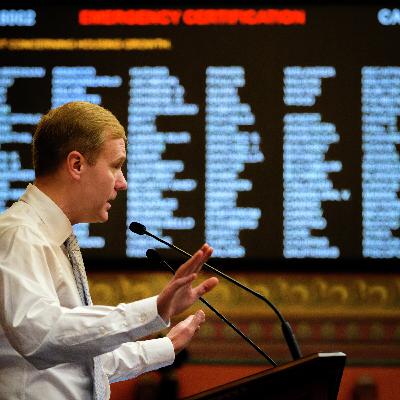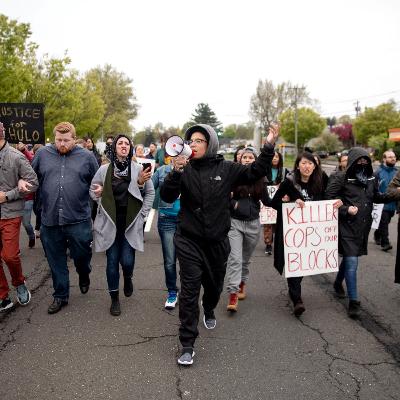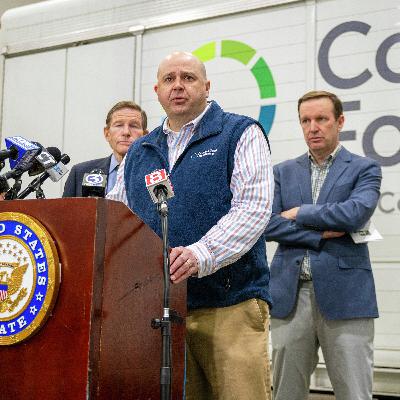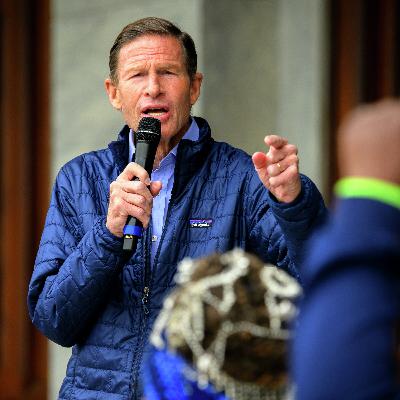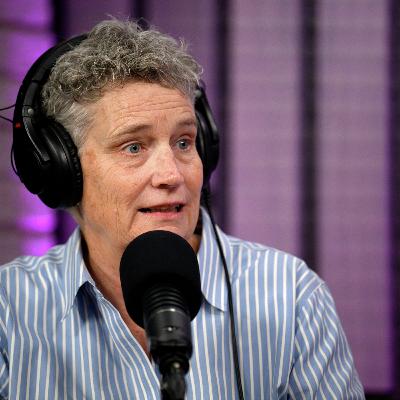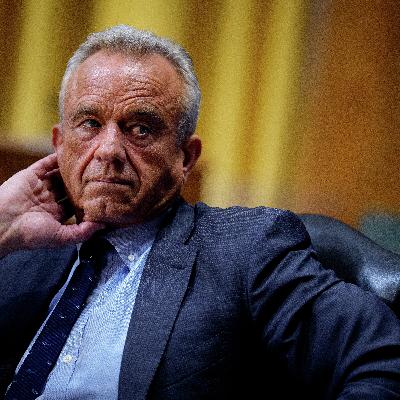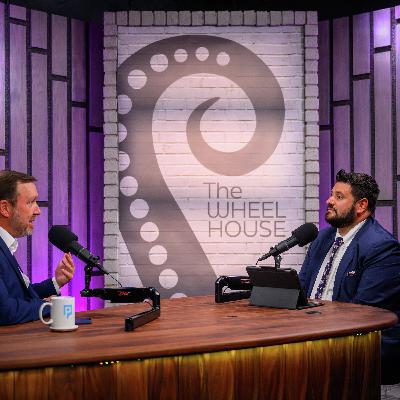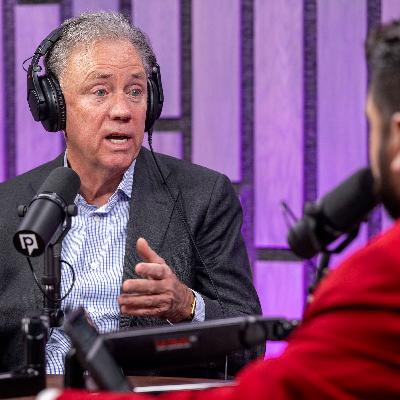Discover The Wheelhouse
The Wheelhouse

The Wheelhouse
Author: Connecticut Public Radio
Subscribed: 94Played: 4,981Subscribe
Share
© 2025 Connecticut Public Radio
Description
If you’re a news junkie — or maybe just news curious, we’ve got your weekly dose of Connecticut politics, tackling everything from tax cuts to human composting. Amplifying important local and national voices, The Wheelhouse walks listeners through the most important political stories of the week. You’ll hear from well-known political reporters, academics, and local journalists across Connecticut’s 169 cities and towns.
375 Episodes
Reverse
Connecticut lawmakers had a lot to do during the latest special session. On top of unfinished housing business, lawmakers had only two days to authorize a $500 million dollar relief package to address federal cuts. They also voted on the purchase of a major hospital and worked to curb increased federal law enforcement efforts in Connecticut. And what about the spectre of rising health insurance premiums in just a few weeks? Today on The Wheelhouse, the skinny on what state lawmakers were able to accomplish in a special session. We’ll also ask what’s next following the longest federal shutdown in US history. GUESTS: Michayla Savitt, state government reporter, Connecticut Public Lisa Hagen, federal policy reporter, Connecticut Public and CT Mirror Abby Brone, housing reporter, Connecticut Public Ginny Monk, children's issues and housing reporter, Connecticut Mirror Support the show: http://wnpr.org/donateSee omnystudio.com/listener for privacy information.
A recent NPR/PBS News/Marist University poll indicated Americans’ displeasure with their government. It found 62% of Americans surveyed believed the country is heading in the wrong direction, while 79 % say the country is going too far to restrict free speech. So, what are people doing with their frustrations? Today on The Wheelhouse, we’re talking with community organizers and researchers who say our voices are stronger than we think. GUESTS: Kerry Ellington, Connecticut-based community organizer Hahrie Han, professor of political science, Johns Hopkins University Support the show: http://wnpr.org/donateSee omnystudio.com/listener for privacy information.
It’s the morning after Election Day 2025 in Connecticut and we’re breaking down the latest results from municipal races across the state. How did an election to name a new mayor in New Britain turn out? What races commanded local attention in your community? And what issues – from education to zoning – motivated you to get out to the polls? Secretary of the State Stephanie Thomas joins us to break down turnout and assess how voting went across Connecticut. And in neighboring New York City, a high-profile race for mayor is reshaping the city. What are the local impacts here in Connecticut? Today on The Wheelhouse, those questions will be tackled as our reporters analyze the 2025 election. GUESTS: Mark Pazniokas, capitol bureau chief and a co-founder, CT Mirror Susan Raff, chief political reporter, WFSB News Ch. 3 Stephanie Thomas, Secretary of the State, State of Connecticut Support the show: http://wnpr.org/donateSee omnystudio.com/listener for privacy information.
More Americans now think violence is necessary to “right” the country than they did 18 months ago. That’s according to polling from NPR, PBS News and Marist University. Meanwhile, the Trump administration has federalized and deployed national guard troops to American cities, sparking a flurry of court challenges and an outbreak of panic. Today on The Wheelhouse, how political violence continues to reverberate throughout the United States. And why, in a country born from a revolution and torn by a Civil War, it’s nothing new. GUESTS: William Tong, attorney general, state of Connecticut State Rep. Corey Paris (D) - Stamford Amilcar Shabazz, professor of African American Studies, University of Massachusetts Amherst Bilal Sekou, Associate professor of political science, University of Hartford Support the show: http://wnpr.org/donateSee omnystudio.com/listener for privacy information.
New data confirms what people pushing for criminal justice reform have been saying for years – racial disparities show up during encounters with police. Researchers at the University of Connecticut say Black people face disproportionate rates of police use-of-force in Connecticut. And that a significant share of those incidents involve someone in mental health distress. Today on The Wheelhouse, what reforms can Connecticut lawmakers take to ensure better policing? Plus, as a government shutdown drags on, we ask how are local families doing? GUESTS: Lisa Hagen, federal policy reporter, Connecticut Public and CT Mirror Ken Barone, project manager, the University of Connecticut’s Institute for Municipal and Regional Policy Jim Haddadin, investigative editor, Connecticut Public Support the show: http://wnpr.org/donateSee omnystudio.com/listener for privacy information.
Polls show that more Americans are embracing socialism. At the same time, politicians that call themselves Democratic Socialists are often painted by conservatives as political extremists. What is a Democratic Socialist? And why is President Donald Trump calling a popular one in the race for New York City’s mayor a communist? Today on the Wheelhouse, we define socialism. We’ll wade through complicated political waters to examine its history and complex ideology. GUESTS: Dan Haar, senior columnist and editor, CT Insider Christopher Vials, professor of English, University of Connecticut Support the show: http://wnpr.org/donateSee omnystudio.com/listener for privacy information.
Recent political violence – and a government shutdown – have turned American politics into a mudslinging free for all. With more attention on owning the other side – and less emphasis on civility, are there still safe spaces for debate?On college campuses a new survey says more students are self-censoring in favor of speaking freely. Today on The Wheelhouse, a temperature check on political dialogue with a college Democrat and a college Republican. How are these Connecticut students charting a path forward? GUESTS: Geoffrey Medeiros, president of College Democrats, University of Connecticut Ryan Rosario, president of College Democrats, University of Connecticut Bilal Sekou, Associate professor of political science, University of Hartford Jonathan Wharton, Associate professor of political science and urban affairs, Southern Connecticut State University Support the show: http://wnpr.org/donateSee omnystudio.com/listener for privacy information.
The Connecticut Sun could be the latest professional franchise to pull out of Connecticut. But a full court press of politicians is working to save the WNBA franchise and keep the team right here in Connecticut. According to CT Insider, lawmakers want to use state pension funds to buy a minority stake in the team. Today on The Wheelhouse, what state officials are doing to “Save Our Sun” in the self-proclaimed the “Basketball Capital of the World.” GUESTS: Sen. Richard Blumenthal, D-Conn. Kurt Badenhausen, sports valuations reporter, Sportico P.R. Lockhart, economic development reporter, CT Mirror Support the show: http://wnpr.org/donateSee omnystudio.com/listener for privacy information.
Beth Bye, a former state lawmaker and outgoing head of the Office of Early Childhood, is retiring from state service after years of work helping young children. Bye’s retirement comes after the state legislature passed a sweeping bill last session offering free child care to many Connecticut families. Today on The Wheelhouse, an exit interview with Beth Bye. Plus, we check in with another advocate for children, Sarah Eagan, about her concern for the state’s social safety net. GUESTS: Beth Bye, commissioner, Connecticut Office of Early Childhood Sarah Eagan, executive director, Center for Children’s Advocacy Georgia Goldburn, executive director, Hope for New Haven, Inc. Michayla Savitt, state government reporter, Connecticut Public Support the show: http://wnpr.org/donateSee omnystudio.com/listener for privacy information.
Federal tax credits for electric vehicles will expire at the end of September. Connecticut residents also won’t be able to access other federal incentives for heat pumps, rooftop solar and home energy audits. Today on The Wheelhouse, how local officials can promote energy efficiency amid a federal rollback on clean energy. Also – Connecticut’s freedom of information law turns 50 this year. We talk to reporters about continued efforts to hold officials accountable in 2025. GUESTS: Katie Dykes, commissioner, Connecticut Department. of Energy and Environmental Protection Áine Pennello, Report for America corps member environmental and climate change reporter at Connecticut Public Chris Harto, senior policy analyst for transportation and energy, Consumer Reports Jacqueline Rabe Thomas, investigative reporter, CT Insider Jim Haddadin, investigative editor, Connecticut Public Support the show: http://wnpr.org/donateSee omnystudio.com/listener for privacy information.
Robert F. Kennedy Jr., the secretary of the U.S. Dept. of Health and Human Services, is defending his policies on Capitol Hill. He recently spoke to Congress following a brain drain at the Centers for Disease Control and Prevention. The CDC’s director was fired. And several other high-level officials have also left the agency. They say Kennedy is weakening the administration with what they call “unscientific views.” Today on The Wheelhouse, we ask public health officials in Connecticut how they’re preparing for the next pandemic and their thoughts on the future of health policy amid a nationwide movement to “Make America Healthy Again.” GUESTS: Apoorva Mandavilli, science and global health reporter, The New York Times Lynn Sosa, Infectious Diseases Director, CT Department of Public Health Sujata Srinivasan, senior health reporter, Connecticut Public Support the show: http://wnpr.org/donateSee omnystudio.com/listener for privacy information.
President Donald Trump declared war on immigration from his first day in office. Since then, the White House has vowed to protect Americans from what it’s calling an “invasion.” U.S. Sen Chris Murphy (D-Conn.) is troubled by recent action, including a statewide sweep by immigration authorities that resulted in 65 arrests. Murphy accuses Trump of using racist tropes on immigration to distract Americans from his “corruption and lawlessness.” Today on The Wheelhouse, we talk to Murphy about the White House’s domestic policy agenda. You’ll also hear from Daniela Doncel and Maysoon Khan, two Connecticut Public reporters, about a special immigration status reserved for abused migrant youth – and how it’s being rolled back. GUESTS: U.S. Sen. Chris Murphy Archon Fung, professor of citizenship and self-government, Harvard University Mark Hugo Lopez, director of race and ethnicity research, Pew Research Center Daniela Doncel, Latino communities reporter, Connecticut Public Maysoon Khan, investigative reporter, Connecticut Public Support the show: http://wnpr.org/donateSee omnystudio.com/listener for privacy information.
Beginning on September 1, Congress will race to finalize the federal budget before the September 30 deadline. And Connecticut’s schools are feeling the ripple effects of funding uncertainty. Today on The Wheelhouse, we talk with educators about the challenges and concerns heading into the new school year. Plus, we take a close look at one Connecticut district experimenting with a year-round calendar. Tune in to hear what this means for students, families, and teachers alike! GUESTS: Kate Dias, president of the Connecticut Education Association Fran Rabinowitz, executive director, Connecticut Association of Public School Superintendents Lisa Hagan, federal policy reporter, CT Mirror and CT Public Cynthia Ritchie, superintendent of schools, New London Public Schools Support the show: http://wnpr.org/donateSee omnystudio.com/listener for privacy information.
How did Connecticut earn the moniker “Constitution State”? Hint – it’s not the Constitution you learned about in history class! We’ll travel back to the 1600s to explore how history, conflict and big aspirations helped shape the state’s identity. GUESTS: Thomas Balcerski, professor of history at Eastern Connecticut State University and director of the Center for Connecticut Studies Kathy Craughwell-Varda, director of Conservation ConneCTion, Connecticut State Library Andrea Rapacz, chief curator of collections, Connecticut Museum of Culture and History Support the show: http://wnpr.org/donateSee omnystudio.com/listener for privacy information.
Even though some anthropologists believe humans are apex predators, a new book argues we’re actually not. Author Kurt Gray posits understanding our vulnerabilities – coming to terms with our former reality as prey – could help us co-exist in tumultuous political times. Today on The Wheelhouse, Gray, a social psychologist at The Ohio State University, discusses his book, “Outraged: Why We Fight About Morality and Politics… and How to Find Common Ground.” GUESTS: Kurt Gray, author, “Outraged: Why We Fight About Morality and Politics and How to Find Common Ground” The Wheelhouse is available as a podcast on Apple Podcasts, Spotify, Amazon Music, TuneIn, Listen Notes, or wherever you get your podcasts. Subscribe and never miss an episode.Support the show: http://wnpr.org/donateSee omnystudio.com/listener for privacy information.
It’s 2025 and next year’s congressional races are already heating up. We’re learning more about U.S. Rep. John Larson’s seat in Connecticut’s First Congressional District. Columnist Dan Haar says the 2026 re-election bid will be Larson’s “toughest challenge” yet. Are Larson’s age and health a primary factor in a prospective close race? Today on The Wheelhouse, Dan Haar and constitutional scholar Akhil Reed Amar tackle that question and explore why the U.S. doesn’t have term limits for Congress. Also, do you know if there’s lead in your home’s drinking water? We talk to the reporters behind a CT Mirror investigation that found lead in the water lines of thousands of Connecticut homes. GUESTS: Akhil Reed Amar, professor of law and political science, Yale University Dan Haar, senior editor and columnist, CT Insider Colin McEnroe, host, "The Colin McEnroe Show" Andrew Brown, investigative reporter, CT Mirror Jenna Carlesso, investigative reporter, CT Mirror Support the show: http://wnpr.org/donateSee omnystudio.com/listener for privacy information.
Gen Z has grown up in an age of school shootings, climate anxiety, the pandemic and the algorithm. With all that they’ve gone through, how is Gen Z engaging with media and with politics? Today on The Wheelhouse, we’re looking at the forces shaping Gen Z in Connecticut and across the nation. We’ll explore how this generation votes at the ballot box and ask what their future role may be in American democracy. GUESTS: Rachel Janfaza, associate writer, CNN Politics Elena Moore, reporter, NPR’s Washington desk Christian Paz, senior politics reporter, Vox Coco Cooley and Isaac Moss assisted in the production of this episode.Support the show: http://wnpr.org/donateSee omnystudio.com/listener for privacy information.
Legislation seeking to address Connecticut’s affordable housing crisis was vetoed earlier this year by Gov. Ned Lamont. But, the proposal could soon come back in a special session. If it does, state lawmakers face a question: can they craft an affordable housing plan that satisfies both the governor and local leaders? Opponents of the original bill say it was pushing quotas on cities and towns. Local leaders said it hampered their ability to make planning and zoning decisions. But supporters say the law was a “meaningful step” forward in a state plagued by high rents and too little housing. Today on The Wheelhouse, what’s next for affordable housing legislation in Connecticut? GUESTS: Rep. Jason Rojas, majority leader, CT House Democrats Sen. Tony Hwang, Republican representing Easton, Fairfield, Newtown Abby Brone, housing reporter, Connecticut Public Ginny Monk, children's issues and housing reporter, Connecticut Mirror Jacqueline Rabe Thomas, investigative reporter, CT Insider Support the show: http://wnpr.org/donateSee omnystudio.com/listener for privacy information.
President Donald Trump’s massive tax-and-spending package is officially the law. The legislation provides tax cuts for some Americans. But it could raise costs for some of the country’s poorest households. That’s due to reductions in Medicaid and food assistance. The legislation Republicans are calling the “big beautiful bill" seeks to cut Medicaid and food stamps by more than $1 trillion. Today on The Wheelhouse, we’ll dig deeper into how the bill will impact SNAP and Medicaid benefits in Connecticut. GUESTS: Andrea Barton Reeves, commissioner, Connecticut Department of Social Services Sujata Srinivasan, senior health reporter, Connecticut Public Amari Brantley, policy coordinator, End Hunger Connecticut! Support the show: http://wnpr.org/donateSee omnystudio.com/listener for privacy information.
Connecticut lawmakers passed some of the most ambitious housing legislation in years this session. The bill looked to address affordable housing, zoning and parking. But then, Gov. Ned Lamont vetoed it. The Democrat is now inviting lawmakers to make a new proposal, which he hopes to pass it later this year in a special session. Today on The Wheelhouse, we’ll speak to the governor live in-studio, asking about that veto. We’ll also get his thoughts on running for a third term. GUESTS: Ned Lamont, governor, state of Connecticut Mark Pazniokas, capitol bureau chief and a co-founder, CT Mirror Liz Kurantowicz, Republican analyst and co-owner, The Drury Group Bilal Sekou, associate professor of political science, University of Hartford The Wheelhouse is available as a podcast on Apple Podcasts, Spotify, Google Podcasts, ASupport the show: http://wnpr.org/donateSee omnystudio.com/listener for privacy information.


